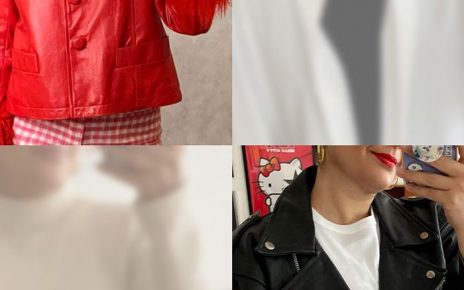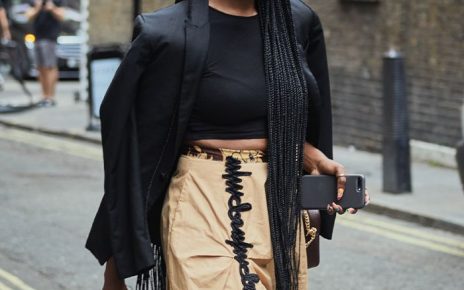 Two popular types of face coverings may not adequately prevent the spread of coronavirus, a new study has found.Plastic face shields and masks with exhalation valves can allow the virus to slip past them, according to a visualization described on Tuesday in the journal Physics of Fluids. Read on, and to ensure your health and the health of others, don't miss these Sure Signs You've Already Had Coronavirus. Droplets can slip inThat model showed that face shields—the clear plastic visors that wrap around the face—can block some droplets from a simulated cough, but small droplets can slip around the sides of the visor and spread widely into the surrounding area.And masks with exhalation valves (face coverings with a plastic plug on the front which allows for easier respiration) are similarly faulty—they allow a stream of respiratory droplets to pass through the valve. If those droplets contain coronavirus, they can be infectious.The results "indicate that face shields and masks with exhale valves may not be as effective as regular face masks in restricting the spread of aerosolized droplets," the study's authors wrote. The best face mask is …Knowing which face coverings are most effective, and which ones may provide a potentially false sense of security, is important on a number of fronts. Eight months into the coronavirus pandemic, it's become a truism that wearing a face mask is more protecting others than protecting yourself. Up to 40% of people infected with coronavirus are asymptomatic, and some never develop symptoms. If you're infected and don't know it, going out in public without adequate facial protection could allow you to spread the virus to others via respiratory particles when you exhale, speak, cough or sneeze—particularly to people who are vulnerable to a severe case of COVID-19, such as the elderly and people with pre-existing conditions. As important as it is to protect others, research also shows that wearing a face mask significantly reduces your own risk of contracting coronavirus. Dr. Anthony Fauci, the nation's top infectious-disease expert, says that risk reduction sits anywhere between 50% and 80%. RELATED: Everything Dr. Fauci Has Said About CoronavirusAccording to the CDC, the most effective face masks have two or more layers of washable, breathable fabric and fit securely around your entire mouth and nose without gaps. What not to wear (face mask edition)The types of masks that should be avoided, according to this and other recent studies, are: * Masks with exhalation valves. On Aug. 6, the CDC officially advised that masks with vents or valves should not be worn. * Neck gaiters (or neck fleeces), which are worn around the neck and pulled up to wrap loosely around the nose and mouth (kind of like a tube top for your head). An August Duke University study found that this type of mask is actually worse than no mask at all.RELATED: COVID Mistakes You Should Never MakeFace shields may be a good protection option—but only in combination with a face mask. Last month, Fauci said that because coronavirus enters the body through mucous membranes, it might be worthwhile to protect your eyes as well as your nose and mouth. Therefore, wearing goggles or a face shield could protect the eyes from airborne droplets of the virus. But as this study shows, face shields may be inadequate to protect others against your own respiratory droplets. So at this point, plastic face shields are not the best choice for a primary face covering without an accompanying mask. (And the CDC does not yet recommend plastic face shields for routine use.)So do everything you can to prevent getting—and spreading—COVID-19 in the first place: Wear the right mask, get tested if you think you have coronavirus, avoid crowds (and bars, and house parties), practice social distancing, only run essential errands, wash your hands regularly, disinfect frequently touched surfaces, and to get through this pandemic at your healthiest, once again don't miss these Sure Signs You've Already Had Coronavirus.
Two popular types of face coverings may not adequately prevent the spread of coronavirus, a new study has found.Plastic face shields and masks with exhalation valves can allow the virus to slip past them, according to a visualization described on Tuesday in the journal Physics of Fluids. Read on, and to ensure your health and the health of others, don't miss these Sure Signs You've Already Had Coronavirus. Droplets can slip inThat model showed that face shields—the clear plastic visors that wrap around the face—can block some droplets from a simulated cough, but small droplets can slip around the sides of the visor and spread widely into the surrounding area.And masks with exhalation valves (face coverings with a plastic plug on the front which allows for easier respiration) are similarly faulty—they allow a stream of respiratory droplets to pass through the valve. If those droplets contain coronavirus, they can be infectious.The results "indicate that face shields and masks with exhale valves may not be as effective as regular face masks in restricting the spread of aerosolized droplets," the study's authors wrote. The best face mask is …Knowing which face coverings are most effective, and which ones may provide a potentially false sense of security, is important on a number of fronts. Eight months into the coronavirus pandemic, it's become a truism that wearing a face mask is more protecting others than protecting yourself. Up to 40% of people infected with coronavirus are asymptomatic, and some never develop symptoms. If you're infected and don't know it, going out in public without adequate facial protection could allow you to spread the virus to others via respiratory particles when you exhale, speak, cough or sneeze—particularly to people who are vulnerable to a severe case of COVID-19, such as the elderly and people with pre-existing conditions. As important as it is to protect others, research also shows that wearing a face mask significantly reduces your own risk of contracting coronavirus. Dr. Anthony Fauci, the nation's top infectious-disease expert, says that risk reduction sits anywhere between 50% and 80%. RELATED: Everything Dr. Fauci Has Said About CoronavirusAccording to the CDC, the most effective face masks have two or more layers of washable, breathable fabric and fit securely around your entire mouth and nose without gaps. What not to wear (face mask edition)The types of masks that should be avoided, according to this and other recent studies, are: * Masks with exhalation valves. On Aug. 6, the CDC officially advised that masks with vents or valves should not be worn. * Neck gaiters (or neck fleeces), which are worn around the neck and pulled up to wrap loosely around the nose and mouth (kind of like a tube top for your head). An August Duke University study found that this type of mask is actually worse than no mask at all.RELATED: COVID Mistakes You Should Never MakeFace shields may be a good protection option—but only in combination with a face mask. Last month, Fauci said that because coronavirus enters the body through mucous membranes, it might be worthwhile to protect your eyes as well as your nose and mouth. Therefore, wearing goggles or a face shield could protect the eyes from airborne droplets of the virus. But as this study shows, face shields may be inadequate to protect others against your own respiratory droplets. So at this point, plastic face shields are not the best choice for a primary face covering without an accompanying mask. (And the CDC does not yet recommend plastic face shields for routine use.)So do everything you can to prevent getting—and spreading—COVID-19 in the first place: Wear the right mask, get tested if you think you have coronavirus, avoid crowds (and bars, and house parties), practice social distancing, only run essential errands, wash your hands regularly, disinfect frequently touched surfaces, and to get through this pandemic at your healthiest, once again don't miss these Sure Signs You've Already Had Coronavirus.




